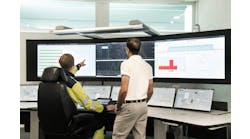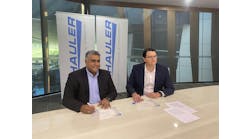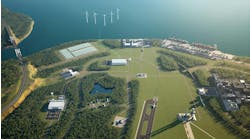The mills of the U.K. criminal justice system as it relates to health and safety issues grind exceeding slow, but they get there in the end. Almost exactly three years after the explosion and fire at the Buncefield oil storage depot some 30 miles northwest of London, the UK Health & Safety Executive (HSE) announced in early December 2008 that five companies, including two instrumentation vendors, would face criminal charges as a result of the incident.
The Buncefield complex, the UK’s fifth largest oil storage depot handling some 2.37 million metric tons of fuel each year, comprised a number of adjacent and interlinked sites, including two operated by Hertfordshire Oil Storage (HOSL), a joint venture between Total and Texaco, and one operated by British Pipeline Agency (BPA), a joint venture between Shell and BP. The sequence of events which led to the explosion and subsequent fire, the largest in Europe since the end of the Second World War, began on the evening of Saturday December 10, 2005, when a BPA pipeline from Thameside began pumping unleaded gasoline into a floating deck, fixed-roof tank on the HOSL west site. At about 5.00 a.m. on the morning of Sunday December 11, the tank began to overflow, creating a vapor cloud as the gasoline splashed on to the external structure. By 6.01 a.m., when the cloud ignited, it is estimated that some 300 tonnes of gasoline had overflowed. The explosion and fire caused enormous damage and disruption, both to nearby residents and adjacent businesses. Because the incident took place early on a Sunday morning rather than during a normal working day when many more people would have been at work in nearby premises, there were no fatalities, although more than 40 people were injured.
System failures
Much of the subsequent investigation, including the critical third progress report issued in May 2006 focussed on why the various monitoring and safety systems failed and why gasoline continued to be pumped into the tank despite the overflow being visible on CCTV. The apparent failure of the high-level switch which was designed to act as a last line of defence against overfilling by shutting off a valve in the line feeding the tank led HSE to issue a Safety Alert in July 2006, drawing the attention of other operators who might be using switches of the same type to the possibility of their being deactivated for test purposes and not reactivated thereafter, although the switch was not directly identified as a possible contributory cause of the accident.
The prosecutions are being brought by HSE and the U.K. Environment Agency against Total UK, Hertfordshire Oil Storage, British Pipeline Agency, TAV Engineering and Motherwell Control Systems 2003, all of whom were summoned to appear before West Hertfordshire Magistrates in Watford on January 23, 2009. The charges facing Total UK are that it failed to ensure, so far as was reasonably practicable, the health, safety and welfare at work of its employees and that persons not in its employment were not exposed to risks to their health or safety between January 1 2003 and December 12, 2005.
Over the same period Hertfordshire Oil Storage is charged with failing to take all measures necessary to prevent major accidents and limit their consequences to persons and the environment while British Pipeline Agency faces the same charge, but relating to the period from November 18, 2001 to December 12, 2005. All three companies are also charged with causing fuel and firewater chemicals to enter ground waters in the chalk aquifer underlying the vicinity of the site.
TAV Engineering is charged with failing to ensure, so far as was reasonably practicable, that persons not in its employment were not exposed to risks to their health or safety over a period from October 31, 2003 to December 12. Motherwell Control Systems 2003 faces the same charge, but between September 28, 2003 and December 12, 2005.
Level control
Based in Christchurch, Dorset, U.K., TAV Engineering describes itself as having “almost 40 years experience in fluid handling and level control” and “designs and manufactures high-quality, purpose-built float switches and level control equipment used in the petrochemical, oil, hydraulics, railway, coal, marine, power, chemical, waste water, food and general engineering industries.”
Based in St. Helens, Lancashire, U.K., Motherwell’s business has since been reorganized under a new holding company, Storage Tank Solutions. Motherwell Tank Protection provides tank breather valves, emergency manways, flame arresters, level gauges and indicators, vents and hatches, and tank blanketing while Motherwell Tank Gauging provides high-accuracy tank radar, radar level gauges, overfill alarm switches, overfill prevention systems, automatic tank gauging systems and oil accounting systems.



